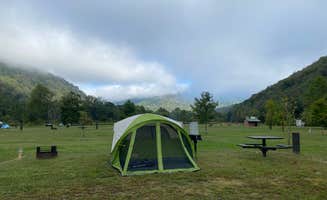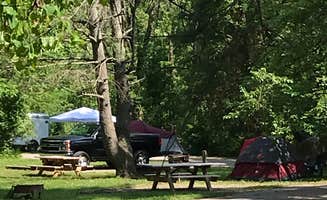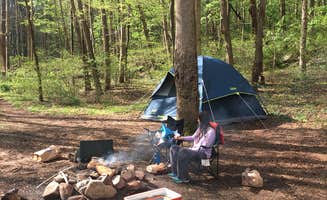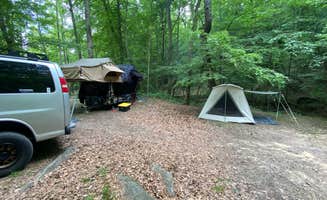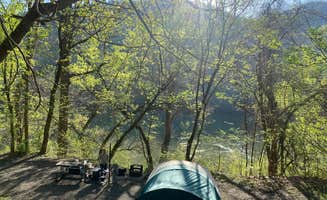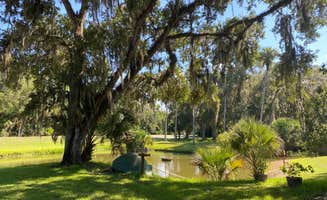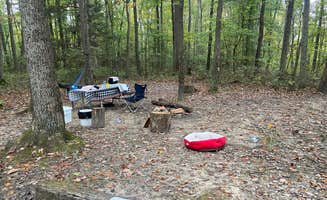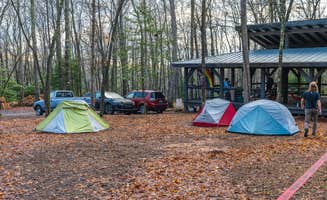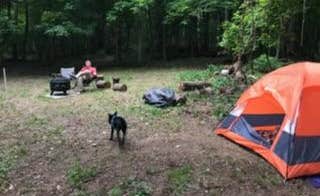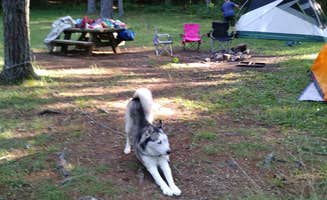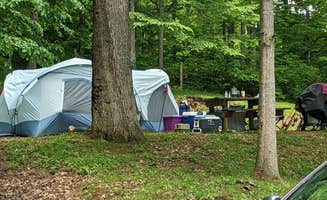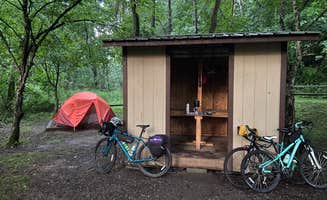Tent camping near Daniels, West Virginia offers a mix of primitive and established sites between 1,100 and 1,400 feet elevation in the Allegheny Plateau. The area experiences distinct seasons with summer temperatures averaging 75-85°F during peak camping months (June-August), while spring and fall bring more variable conditions. The camping terrain alternates between riverside locations and elevated forest settings, with most sites seeing moderate rainfall even during summer months.
What to do
Fishing opportunities: At Bull Falls Campground, visitors can access prime fishing spots along the New River. "You've struck gold here at Bull Falls Campground if you're looking to get away from it all...a fantastic spot for you to bring all your water toys from snorkeling and innertubes to fishing, kayaking and anything else that you want to submerge in this slow moving, tranquil snake-like river," reports one camper.
Hiking options: Multiple trails of varying difficulty surround the camping areas. A camper at Stone Cliff Campground noted, "I loved the experience I had at stone cliff. The camp sites are well marked and maintained...Great spot to set up a hammock, go swimming, or walk on the nearby trails if you aren't climbing." Many trails connect directly to camping areas, allowing for convenient day hikes.
Water activities: Kayaking and swimming options exist at several locations. According to a visitor, "The swimming was A+ and the stick selection was up to her standards" when referring to their dog at Stone Cliff. Bluestone Lake also offers alternative water recreation with less current than the river sections.
What campers like
Privacy between sites: Campers frequently mention the spacing between tent sites as a major advantage. At Chestnut Creek Campground, a reviewer described, "This is a quiet campground, with lots of space and site options, run independently by a family...There are lots of trees in between many of the sites for great privacy."
Natural surroundings: The diverse ecosystem provides varied camping environments. "We stayed at site 23, which had a tent platform high up on a boulder. The campsite was fairly quiet and cozy!" shared a visitor to New River Gorge Campground. Many tent sites feature unique placement within the natural landscape.
Proximity to attractions: The central location makes exploring the region convenient. One camper at New River Gorge Campground mentioned it's "really nice. Super clean bathrooms and flat platforms for tent camping...easy to get to and close to lots of climbing." Most campgrounds are within 30 minutes of major regional attractions.
What you should know
Train noise considerations: Railroad activity affects multiple camping areas. A camper at Meadow Creek Campground warned, "The biggest con to this is the multi-track railroad right next to the campground. They go by pretty frequently at all hours of day and night and are so loud you can feel the vibrations."
Seasonal limitations: Weather patterns impact camping conditions throughout the year. "Open year round- a no hunting campsite," notes a Meadow Creek visitor, though they caution about fluctuating temperatures. Spring camping often encounters more precipitation while summer brings higher humidity.
Bathroom facilities vary: Toilet and shower availability differs significantly between locations. A visitor at Chestnut Creek Campground shared, "There is only one bath house and it can be a short hike depending on the location of your site, but it was clean, had several stalls, showers, sinks and electricity." Many primitive sites only offer vault toilets without running water.
Tips for camping with families
Site selection advice: Choose camping areas based on needed amenities and access. For families at Bluestone State Park, a visitor recommended, "West Virginia at its finest! Blue stone state park is right next door to the lake so there are wonderful water activities here...They had a swimming pool and it was clean." Sites closer to facilities generally work better for families with young children.
Wildlife viewing opportunities: The region offers chances to observe native species. "We were able to see deer, raccoons and some nice looking birds," shared a camper. Morning and evening hours provide the best wildlife viewing times.
Navigation challenges: Some campgrounds have access issues. "Google maps does not take you there, it took us to the other side of the river," warned a Brooklyn Campground visitor. Printing directions or downloading offline maps is recommended as cell service can be inconsistent throughout the region.
Tips from RVers
Access restrictions: Several tent-only areas enforce vehicle limitations. A camper at Meadow Creek noted, "The ranger informed us someone who stayed here in a rv had a close call crossing the train tracks and now they have decided to make this campground a tent only place...You have to cross train tracks to get here and it's 4 sets of tracks all are very active with trains coming as often as every 20 minutes."
Road conditions: Approach roads to some campgrounds present challenges. A visitor to Plum Orchard Lake described, "Long, bumpy dirt road to reach the campsite—it could be fun in the right vehicle." Larger vehicles may struggle with narrow access roads at certain locations.
Site dimensions: Tent sites often have specific sizing constraints. "Each site has a wooden tent platform (10'x10') to set up on," mentioned a New River Gorge Campground camper, which can limit tent size and configuration options.


